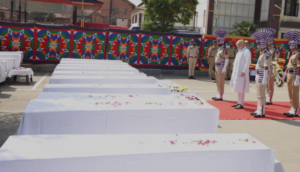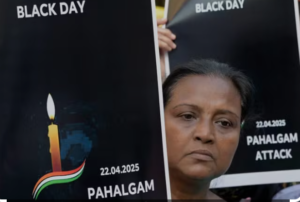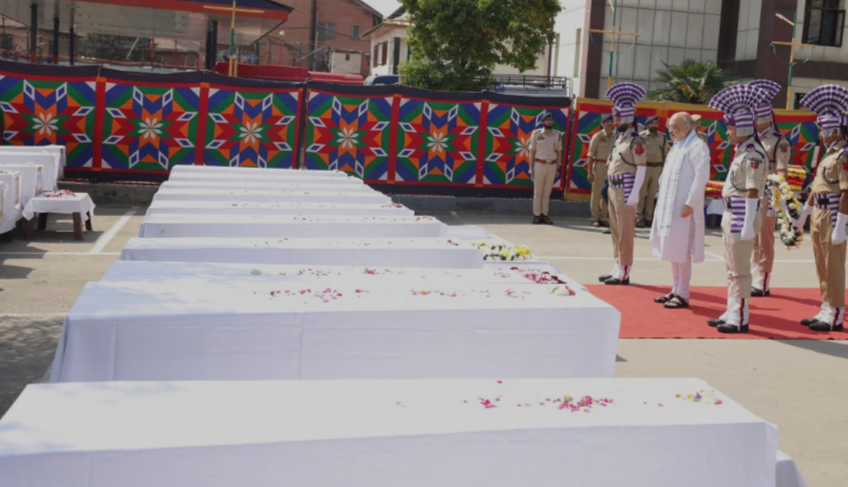A Tragic Day in Baisaran Valley, Pahalgam,Kashmir : Terrorist attack in India
On the quiet afternoon of April 22, what was meant to be a peaceful escape for many turned into a nightmare. Around 2:50 PM, in the serene Baisaran Valley near Pahalgam—a picturesque tourist spot nestled in the mountains of Indian-administered Kashmir—terror struck without warning.
Seven militants, armed with deadly M4 carbines and AK-47s, emerged from the nearby forests. Dressed in military-style uniforms, they took advantage of the crowd of tourists who were enjoying the clear skies after days of rain. The beauty of the moment was shattered in an instant as the attackers opened fire.
According to those who survived, the gunmen asked for names Asked their religion , demanded victims to recite the kalma, and checked for circumcisions—ensuring they spared Muslims and targeted non-Muslims. What followed was pure horror. Eyewitness videos show scenes of chaos, with injured people crying for help. A woman’s desperate screams for her wounded husband echoed in the valley, while others lay still on the grass, some never to rise again.
Casualties Occurred
At least 28 lives were cruelly taken that day. Among them were 24 Indian tourists from different states, two locals from Jammu and Kashmir, and two foreign nationals from Nepal and the UAE. Many others were left critically injured. Emergency teams rushed to the scene as soon as word of the attack reached the district headquarters. Two of the most seriously hurt were brought to Anantnag District Hospital, and several others were airlifted to Srinagar for advanced care.

Even amidst the tragedy, there were moments of humanity. Local pony-handlers, with nothing but their will to help, carried injured tourists on makeshift stretchers and ponies. Thanks to their courage, around 11 people were rescued from the massacre site.
Survivors recall chilling details. One of the attackers reportedly told a woman she was being spared so she could “tell the Prime Minister what happened here.” Many victims were shot at close range. The images—bloodstained fields, helpless cries, lifeless bodies—are now etched into the memories of those who witnessed the terror.
Investigation And Research
Following the attack, a joint operation by the Indian Army and local police began immediately. Helicopters scoured the mountains, and a lockdown was put in place to protect the surrounding area.
The victims were from all walks of life—young, old, families on vacation. Among the dead was a 26-year-old officer from the Indian Navy and an official from the Intelligence Bureau. The pain ripples across states—from Karnataka to Kerala, from Odisha to Uttar Pradesh.
The National Investigation Agency began its probe the following day. Sketches of three suspects were released, all believed to be connected to the terror group Lashkar-e-Taiba. Investigators named Saifullah Kasuri, also known as Khalid, a top LeT commander, as the suspected mastermind behind this brutal act.
This was not just an attack on individuals. It was an assault on peace, on innocence, on the simple human joy of exploring a beautiful place with loved ones. And while the valley of Baisaran may heal with time, the scars left behind—on families, on hearts, on a nation—will not fade so easily.

Indian Government’s Thrilling Reaction : Prime Minister Narendra Modi Shocks everyone
Indian Prime Minister Narendra Modi cut short his visit to Saudi Arabia, vowing that those behind the attack would be held accountable and reaffirming India’s commitment to fighting terrorism. Meanwhile, Union Home Minister Amit Shah traveled to Srinagar to personally assess the situation and oversee the security response. Finance Minister Nirmala Sitharaman also ended her official trip to the United States and Peru ahead of schedule to return to India.
Security forces quickly launched a manhunt to track down those responsible, while a helpline was set up to support affected tourists. In the aftermath of the attack, there was a noticeable rise in the number of tourists leaving Jammu and Kashmir, prompting Air India to add more flights from the region.
On April 23, the Indian Army granted limited clearance for the use of HAL Dhruv helicopters in counter-terrorism operations, even though the rest of the fleet remained grounded.
Protests erupted across Indian-administered Kashmir, with demonstrators condemning the attack. In some areas, particularly in Jammu, protestors accused Pakistan of being involved.
Later that night, during a special press briefing, India’s Foreign Secretary announced that, following a high-level Cabinet Committee on Security (CCS) meeting, the country would temporarily suspend the Indus Waters Treaty with Pakistan, effective immediately. Additionally, the Attari-Wagah border crossing was closed, and a ban was imposed on Pakistani nationals traveling to India. India also expelled Pakistani military advisers from the High Commission in New Delhi, recalled its own military staff from Islamabad, and scaled down its diplomatic presence in Pakistan.

